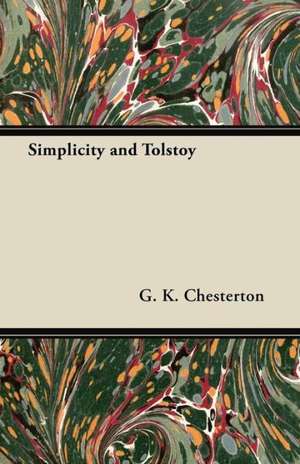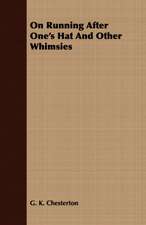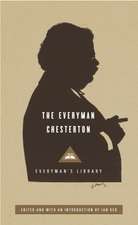Simplicity and Tolstoy
Autor G. K. Chestertonen Limba Engleză Paperback – 31 oct 2012
Preț: 164.75 lei
Nou
Puncte Express: 247
Preț estimativ în valută:
31.53€ • 34.24$ • 26.48£
31.53€ • 34.24$ • 26.48£
Carte tipărită la comandă
Livrare economică 22 aprilie-06 mai
Preluare comenzi: 021 569.72.76
Specificații
ISBN-13: 9781447465423
ISBN-10: 1447465423
Pagini: 92
Dimensiuni: 140 x 216 x 5 mm
Greutate: 0.13 kg
Editura: BLUMENFELD PR
ISBN-10: 1447465423
Pagini: 92
Dimensiuni: 140 x 216 x 5 mm
Greutate: 0.13 kg
Editura: BLUMENFELD PR
Notă biografică
Gilbert Keith Chesterton (1874 - 1936), better known as G. K. Chesterton, was an English writer, poet, philosopher, dramatist, journalist, orator, lay theologian, biographer and literary and art critic. Chesterton is often referred to as the "prince of paradox". Time magazine has observed of his writing style: "Whenever possible Chesterton made his points with popular sayings, proverbs, allegories-first carefully turning them inside out." Chesterton is well known for his fictional priest-detective Father Brown and for his reasoned apologetics. Even some of those who disagree with him have recognized the wide appeal of such works as Orthodoxy and The Everlasting Man. Chesterton, as a political thinker, cast aspersions on both Progressivism and Conservatism, saying, "The whole modern world has divided itself into Conservatives and Progressives. The business of Progressives is to go on making mistakes. The business of the Conservatives is to prevent the mistakes from being corrected." Chesterton routinely referred to himself as an "orthodox" Christian and came to identify this position more and more with Catholicism, eventually converting to Catholicism from High Church Anglicanism. George Bernard Shaw, Chesterton's "friendly enemy" according to Time, said of him, "He was a man of colossal genius."



